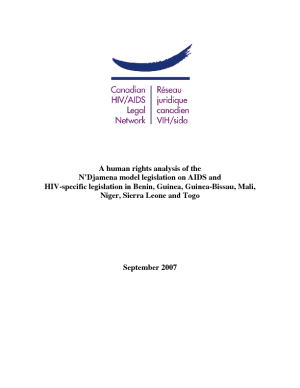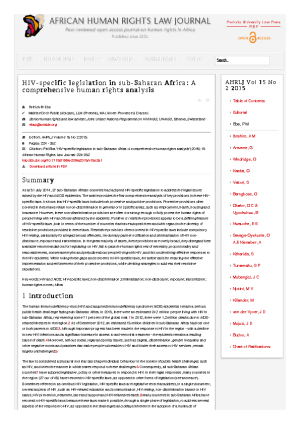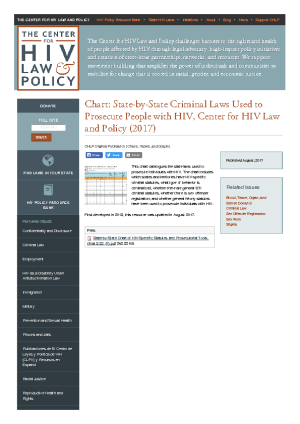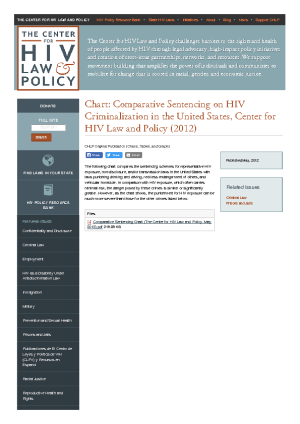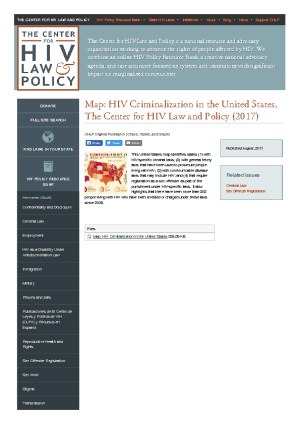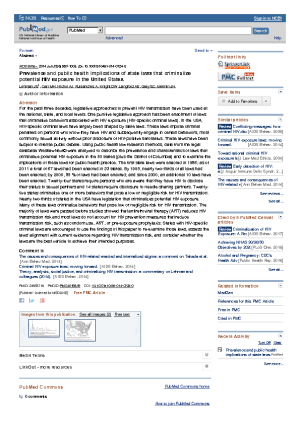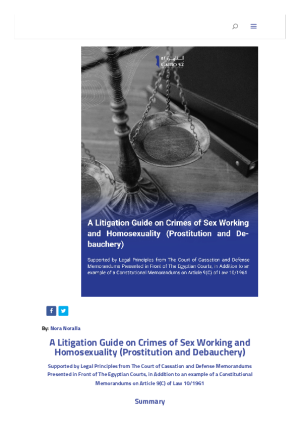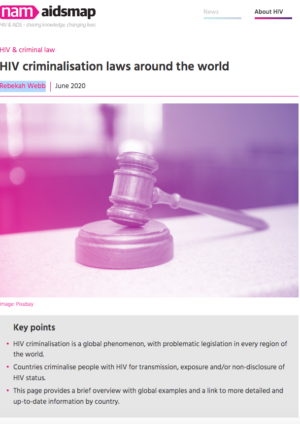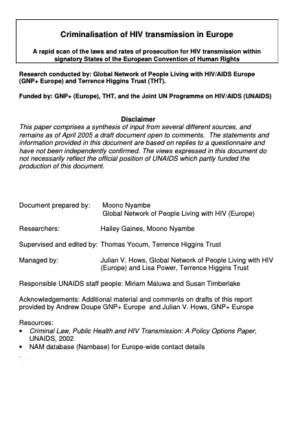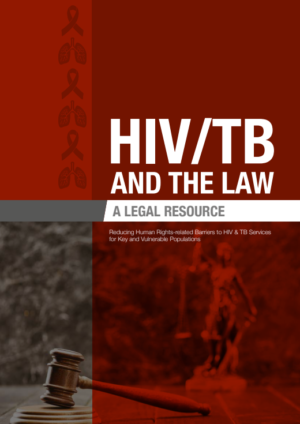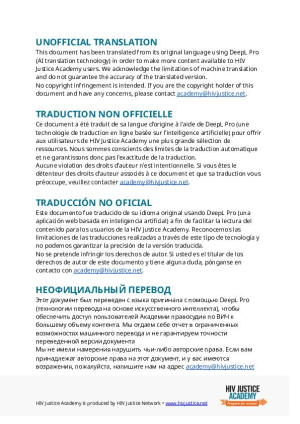Detailed information and analyses of HIV-specific legislation in seven Central and West African countries from a human rights perspective. Provides commentary on N’Djamena model legislation on HIV/AIDS (2004).
Knowing the law
These resources clarify existing laws in particular countries. They represent good examples of advocates’ work to discover and understand the law in their jurisdictions. Resources include charts (listing laws), maps and articles.
HIV-specific legislation in sub-Saharan Africa: A comprehensive human rights analysis
Analyses key provisions in HIV-specific laws, outlining both protective and punitive provisions including criminalisation of HIV non-disclosure, exposure and transmission. Argues these provisions are generally overly broad, disregarding the best available recommendations for legislating on HIV; failing the human rights test of necessity, proportionality and reasonableness; consecrating myths and prejudice; and undermining HIV responses.
State-by-State Chart of HIV – Specific Statutes and Prosecutorial Tools
This chart from the Center for HIV Law and Policy, developed in 2013 and last updated in 2017, details each U.S. state’s HIV-specific laws in relation to various areas including spitting, biting, sharing needles, sex, and sex work, as well as HIV-specific sentence enhancement.
Comparative Sentencing Chart on HIV Criminalization in the United States
This chart, published by the Center for HIV Law and Policy in 2012, compares U.S. legislation on sentencing for HIV exposure, non-disclosure, and transmission with laws punishing drinking and driving, reckless endangerment of others, and vehicular homicide, showing HIV exposure frequently carries far higher sentences than more dangerous crimes.
When Sex is a Crime and Spit is a Dangerous Weapon: A Snapshot of HIV Criminalization in the United States
Map by the Center for HIV Law and Policy showing details of U.S. states with HIV specific laws, HIV-related prosecutions, sentence enhancement provisions, and sex offender registration.
Prevalence and public health implications of state laws that criminalize potential HIV exposure in the United States
Describes the prevalence and characteristics of laws criminalizing HIV exposure across the U.S., examining the implications of these laws for public health practice. Finds that nearly two-thirds of states have legislation criminalizing potential HIV exposure, including behaviours that pose low or negligible risk. States are encouraged to re-examine HIV-specific laws (referencing current science) and consider whether current laws are the best vehicle to achieve their intended purposes.
Criminalising contagion – Legislative epidemics: the role of model law in the transnational trend to criminalise HIV transmission
Explains how an epidemic of HIV criminalisation laws spread across the West and Central Africa regions enabled by model laws (the N’Djamena Model Law) drafted by USAID.
A Litigation Guide on Crimes of Sex Working and Homosexuality
This an English Summary of the book “A Litigation Guide on Crimes of Sex Working and Homosexuality (Prostitution and Debauchery) “. The book aims to provide a litigation guide and a legal overview of principles and procedures to legal advocates and whoever wishes to know more about “prostitution” or “debauchery” crimes under Egyptian law.
HIV criminalisation laws around the world
HIV criminalisation is a global phenomenon, with problematic legislation in every region of the world. Countries criminalise people with HIV for transmission, exposure and/or non-disclosure of HIV status. This page provides a brief overview with global examples and a link to more detailed and up-to-date information by country.
Judgment C-248/19 – Lawsuit challenging the constitutionality of Article 370 of Law 599 of 2000 “Whereby the Criminal Code is issued.”
The decision of the Constitutional Court of Colombia to eliminate section 370 of the criminal code that criminalised the transmission of HIV.
GNP+ and THT. Criminalisation of HIV transmission in Europe: A rapid scan (2005)
This paper, prepared by Moono Nyambe at GNP+, and managed by Julian Hows (GNP+) and Lisa Power (Terrence Higgins Trust) comprised a synthesis of input from several different sources, pubished in April 2005 as a draft document open to comments. The statements and information provided in this document are based on replies to a questionnaire and have not been independently confirmed. The views expressed in this document do not necessarily reflect the official position of UNAIDS which partly funded its production.
Respondents from 41 out of 45 countries provided information for the study. Of the respondents from the 41 countries that were able to provide information, it was reported that in at least 36 countries the actual or potential transmission of HIV can constitute a criminal offence. This supported anecdotal evidence that increasingly the law is seen as a tool for regulating conduct that can lead to HIV transmission. In 21 of these countries, it was reported that at least one person has been prosecuted.
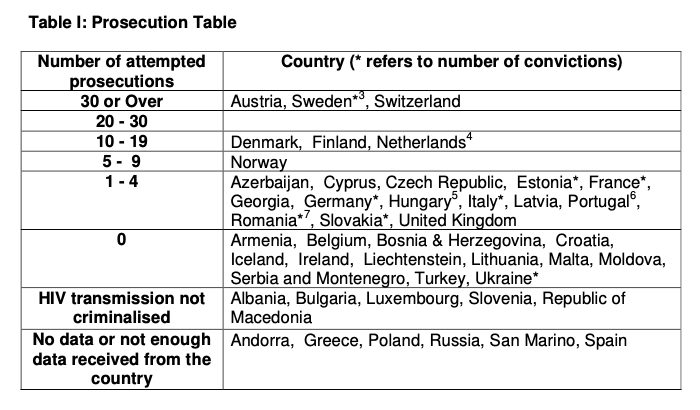
Reducing Human Rights Related Barriers to HIV & TB Services for Key and Vulnerable Populations: Legal Support Resource
The legal support resource is part of an on -going human rights programme with the goal of reaching key and vulnerable populations by utilising customised and targeted interventions. These interventions include activities on (1) legal empowerment;(2) training of paralegals on issues related to HIV, TB and human rights; (3) legal and paralegal support to community members whose human rights have been violated including pursuing identified matters to court; and (4) sensitisation of judiciary, law makers and traditional leadership especially those involved in traditional courts.
It gives practical information on current and evolving legislation, common law and policies pertaining to HIV and TB in South Africa. The aim is to educate, sensitise and provide updated information to paralegal and legal practitioners alike, who are engaged in offering legal advice and services to individuals and communities who serve members of the vulnerable and key populations.
Supreme Court of Finland R2012/1093 – KKO:2015:83
A, aware of his HIV infection, had several times unprotected anal sex with B without telling him about his illness. B had not been infected with HIV. The question of whether A had caused a serious danger to B’s life or health.
This document has been translated from its original language using DeepL Pro (AI translation technology) in order to make more content available to HIV Justice Academy users. We acknowledge the limitations of machine translation and do not guarantee the accuracy of the translated version.
Original text is available at https://finlex.fi/fi/oikeus/kko/kko/2015/20150083
